Granblue Fantasy Versus is a 2D fighting game developed by Arc System Works set in the world of the hit mobile Gatcha game of the same name minus the 'Versus.' The game lets players take control of some of the most memorable characters in the series, with Arc System Works doing a tremendous job of making them feel alive, thanks to their trademark use of the Unreal engine. Whether it's in Guilty Gear, Dragon Ball FighterZ or this game, I for one think no one can make an anime fighting game come alive better than Arc System Works. The game also has a self-contained story, which is presented via the game's story mode that functions a bit more like a beat-em-up version of the RPG. It's a little lackluster, but one that makes the game quite unique among its peers.
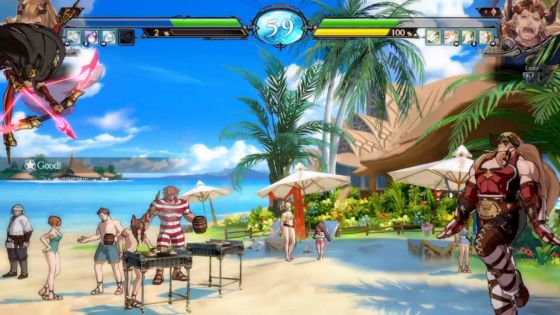
Contrary to Arc System's previous works, the game at its core is very simple and neutral-heavy; in fact, almost Super Turbo-ish. A far cry from the mechanically heavy titles in the developer's arsenal, but it does not shy in delivering explosive and stylish matches nonetheless, even at the cost of being mechanically simpler than its fighting game predecessors.
To say the least, Granblue Fantasy Versus is a game that puts a heavy emphasis on being newbie-friendly, with various tools that really lower its skill floor. The game boasts a total of 11 characters on release, with 6 more on the way via paid DLC. It's honestly a rather small number, considering that the game its based on has a treasure trove of characters. Well, if Dragon Ball FighterZ was anything to go by, I guess this means we'll be getting more than one season pass in the future.
Gameplay 8/10
As was stated, Granblue Fantasy Versus is a very simple fighting game, and focuses on a more bare-bones form of combat, almost like a cross between Super Turbo and Samurai Shodown where you have to be slightly more deliberate with your attacks. This makes committing to moves feel rather risky and almost methodical, as recovery animations after whiffing moves tend to be quite punishable.
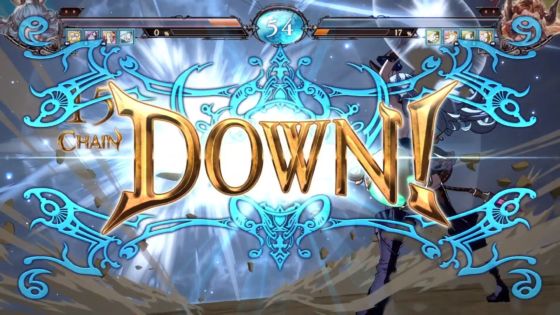
The game is a 5-6 button fighter depending on your preferences. You have the typical light, medium, and heavy attacks, a unique attack button, the block button (which I'll get to later on), and the skill button for those who want to do cool moves on the fly. Some would say that it's a 4-button fighting game, but the block button does more than just blocking, and is used to perform dodges, which is quite important when dealing with certain characters. It's a shame that they couldn't just find a two-button combination for dodges for players who don't use it.
Instead of cycling through a combination of different button presses to land combos, the game uses three default auto-combos per character that consists of pressing the same button (be it Light, Medium, or Heavy) three times. Anything more advanced is a bit more situational, and are mostly done in the corner. I was turned off by this during the beta, as I expected something a bit more complex after seeing the original teaser, as well as my familiarity with the Arc System fighting game pedigree. Persona 4 Arena and Dragon Ball FighterZ did have something similar to this, but rarely did I see those auto-combos get used outside very casual matches. If you're looking to play this game, you're going to have to accept that auto-combos will be your bread and butter, and are weaved into even the most competitive of matches.
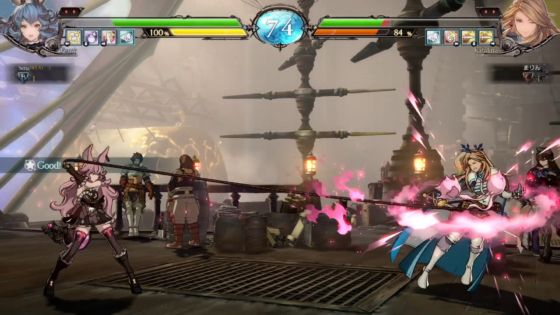
Much like your combos, your special moves also have Light, Medium, and Heavy variants, with the latter being similar to Street Fighter's EX moves, which granting additional properties such as invulnerability during its start-up frames. Some 'Heavy' specials can also act as combo extenders, allowing players to link more hits in for massive damage. This, however, comes with a bit of a caveat, as the strength of your skill also determines how long it takes to go off cooldown.
New to this game, and possibly in all fighting games, is the concept of skill cooldowns, which is Granblue Fantasy Versus' way of integrating its RPG mechanics into its system. This means that using a skill renders the move unavailable for use until said timer ends. This was an issue for me back in the beta, as it felt like I was being robbed of a supposed advantage whenever I landed combo extensions or hit my opponents with my stronger skills in-between combos. It's almost as if the game is purposely limiting advantages and leveling the playing field somewhat. Thankfully the cooldowns felt more reasonable after the game's official release, and the only times I've have to worry about these pesky timers was when I risked throwing things out without thinking.
Another changer for me is the game's way of managing meter, as there simply isn't any form of meter management outside not dying before it fills up. Since the game's skills are tied to its cooldown system, you'll often have enough meter to perform your Skybound Arts (super) or Super Skybound Art if your HP is low enough. I mean, Supers don't generally guarantee a win, but some characters do have it better than others—of course I'm talking about Lowain, who can summon Yggdrasil and turn the fight into a legit boss fight when given the chance to activate his Super Skybound Art. I'm not saying it's impossible, but there is a hefty amount of adjusting required when fighting against an experienced Lowain player, and the fast meter gain just means you'll find yourself in that hellish situation more often than not.
Tip: learn how to deal with Yggdrasil.
Innovation: 7/10
While Granblue Fantasy Versus was gracious enough to give us a full-blown RPG inside a fighting game, I can't say I'm all that impressed with the system. A chunk of the upgrading, the gear 'Gatcha,' felt like it was taken straight out of the mobile game. It's a really cool concept, but its execution still felt lacking for me. In the end, this a fighting game, and while the boss battles were cool the rest just felt like filler mini games with some mobs being picky with how you hit them. It didn't help that the missions also took place in stages I've seen over and over again via versus mode, limiting the wonder of seeing a new area.
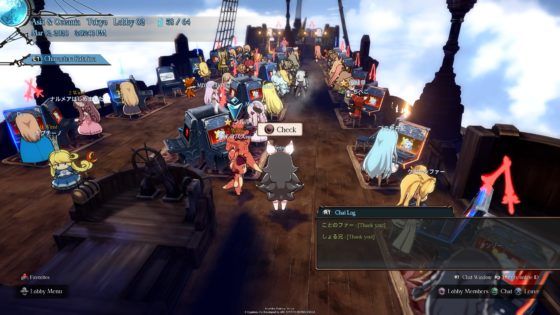 Granblue Fantasy: Versus_20200312150740
Granblue Fantasy: Versus_20200312150740
I'd say GBFV took newbie-friendliness to a whole new level. The addition of a skill button was actually a good choice. The skill button functions a lot like in Super Smash Bros, where different skills are mapped to a combination of each of the cardinal directions plus the skill button. Damage done when using shortcuts are scaled down, however, prompting those who wish to actually want to play the game seriously to learn the proper inputs.
As much as I love Arcsys' games, they really still fail in the netcode department, with Granblue Fantasy Versus still using the same delay-based netcode that feels like an ancient relic at this point. Matchmaking for ranked still gives you the more than occasional laggy opponents, and joining lobbies is still the best way to find a good match
.
Learning Curve: 10/10
It's true that fighting games aren't for everyone, and as a game whose audience may consist more of fighting game newbies who were influenced into the game buying solely due to its connection with the mobile 'Gatcha', a perfect level of complexity had to be established.
[caption id="attachment_347732" align="aligncenter" width="560"]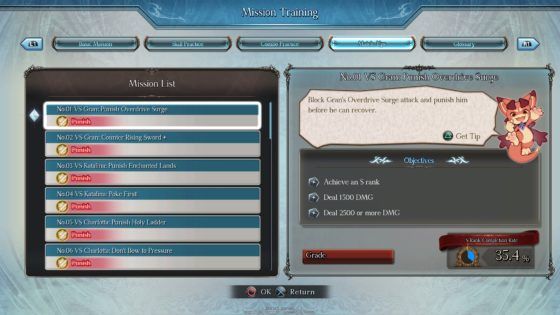 Granblue Fantasy: Versus_20200312150242[/caption]
Granblue Fantasy: Versus_20200312150242[/caption]
As stated by game's director, their objective was to make a fighting game that's not combo-centric and highly accessible for beginners. In all honestly, I think that Granblue Fantasy Versus succeeded in delivering one if not the most newbie friendly fighting game in existence, with its comprehensive set of tutorials that not only teaches players practical combos and a deeper take on the system, but also character matchups and getting out of potential situations. Leave it to Arc Systems Works to keep surprising us.
Graphics and Sounds: 8/10
Even at a glance, it's easy to recognize that trademark Arcsys style made famous by Guilty Gear Xrd. The devs did an amazing job in animating the characters with an astounding attention to detail. You could say it's a perfect fit. The cinematic feel of the Skybound arts also carry a certain amount of “UMPH” that almost makes it just as rewarding to look as it is to play. The vibrant, almost painted-looking backgrounds also help set the tone, keeping the overall feel of the original game and giving it that authentic Granblue aura. The soundtrack also fails to disappoint, offering a mix of rock and some revisions of existing Granblue themes to fuel all the adrenaline.
Value: 6/10
Much as I enjoyed this game, it certainly left much to be desired for the hefty price. While one can argue that the game featured a deep RPG mode, it isn't really as prominent in the long run given that the game at its core doesn't really use it (it's a fighting game). Indeed, more characters would have been better. I'm not a fan of the small roster, especially given that the series does have so many characters to choose from. The season pass will include additional characters, but it feels bad to pay extra given the limited initial roster. Don't get me wrong, it's a great game, and I'm fine with a chunk of what I got, but they definitely could have included more.
Overall: 8/10
Despite its shortcomings, I loved Granblue Fantasy Versus. I've never played the original game, but the characters do feel right at home in a fighting game setting. The 6 DLC characters should be good for variety when they come out, and if Dragon Ball FighterZ is anything to go by, we should be seeing season 2 in the next few months.
The game's already being embraced by the fighting game community, so if you're looking to start playing fighting games, this is probably one of the better titles to get.